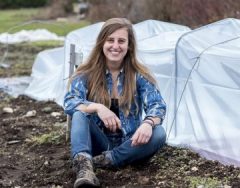Work Learn Profile: Nikki Lax, Seed Trials Work Learn Student

What do you study?
I am a 3rd year Plant and Soil Biology student in LFS. The idea of agroecology or having a farm in an ecosystem is exciting to me which is why I decided to be in this program.
I come with some farming background and a great admiration for nature that inspires me to learn more about sustainable agriculture. I want to learn how it works and more importantly where I fit within it. Luckily, whilst interning here, I got to learn and then walk back outside and feel like I can see what can be done. Looking at trees, crops, soil, and plants, I feel like I can empathize with them more and appreciate them more because I know more. Studying plant and soil science is amazing to get to learn how plants work, learn how what makes them grow better, what affects their growth, how well they can grow. And then getting to apply that to the field and see it in action, understanding what’s going on. So, when you look at a plant, the more you know the greater appreciation you have for it. And I got see them in a new light as well, from a more research perspective.
What was your internship?
My internship was with the BC Seed Trials which is part of a larger project that is throughout BC. The organization is a collaboration of FarmFolkCityFolk, Bauta Family Initiative on Canadian Seed Security and UBC Farm. As it is largely based at the UBC Farm, I got to be part of the research and helped with the organization as well. Essentially, we were conducting kale and some spinach trials, with input from local farmers, to identify varieties which perform best in each region as well as those varieties which can be scaled up for bulk seed production. This meant a lot of harvesting, measuring, weighing and working with our collected data. But apart from field work, I got to meet incredible people involved in this discipline which includes farmers, advocates, and academics. I was fortunate enough to attend the BC EcoSeed Co-op Conference which was a great opportunity for us to show and summarize our findings of our research and see for this upcoming season of what the farmers wanted for their farms and how they wanted to collaborate. Generally, the internship was a way for me to reconnect with the Farm. Even though I had volunteered and visited for some of my classes before, I wanted to get a step closer to it and this internship allowed me to do that.
What is one thing you found interesting during your internship?
The most interesting part of my internship was getting to go to the BC EcoSeed Coop Conference and talking directly to farmers. This meant hearing their perspectives on everything. The conference included many angles of farmers’ thoughts but the most important angle for our project was what crops we should trial this year. It was interesting what crops they were concerned about and to see which factors went into their decision making. As someone who foresees a future in farming, it was great to be exposed to what concerns the present BC agriculture of world. Very different concerns in California or other places. So, that was an awesome exposure to the real world of farming. Especially of organic sustainable farming.
What intrigues you about the food system?
The food system is something we interact with every day. It is also a very complex system; there is so much to learn and so many components to it. You don’t always think what’s going on or what your impacts on the environment and I think food is so approachable and accomplishable to make better choices on and be friendlier to the environment. Food easily connects people which can lead to making more sustainable choices. I think my impact through agriculture had led me to the kind of field that I am in now. Being able to learn the signs behind what’s going on out there and then seeing how we can improve to be better on the environment gives me hope about the food system and pushes me to learn more.
What is the UBC Farm to you?
UBC Farm is an example of what farming can be if people are invested in the sustainability of the food system. The integration of not just the local ecosystem but the local community helps it thrive more so than any other environmental initiatives. It has created a full circle food system for everyone to see or be involved with. The fact that UBC Farm is much larger scale than any small permaculture gardens or small little farms and people often question sustainable agriculture being a possibility to grow food and make things work. And I think UBC Farm serves as a good example that it can work. And we can also use it to teach people. I think the farm here is such a good ground for teaching, exposing people to this whole subject and a very inspiring place to be. It is so unique in a sense that it isn’t just a farm but a sustainable forward thinking farm that’s involved in lots of people in the community. People should know that the farm exists and has its gates open to everyone. UBC Farm can serve both as a production tool to provide sustainably grown food for people but also can serve as a huge educational tool and outreach tool just by being a farm.


Comments are closed, but trackbacks and pingbacks are open.